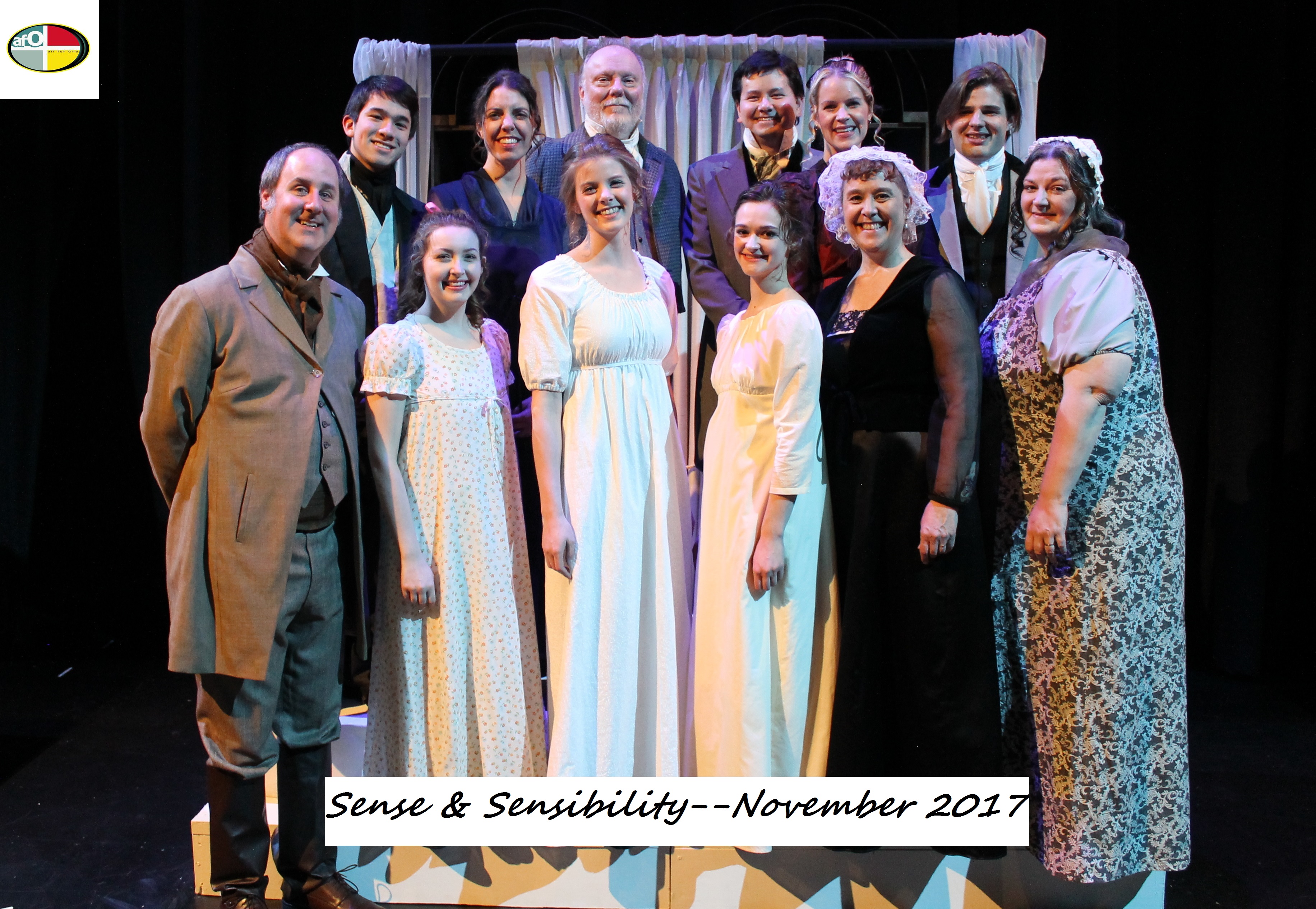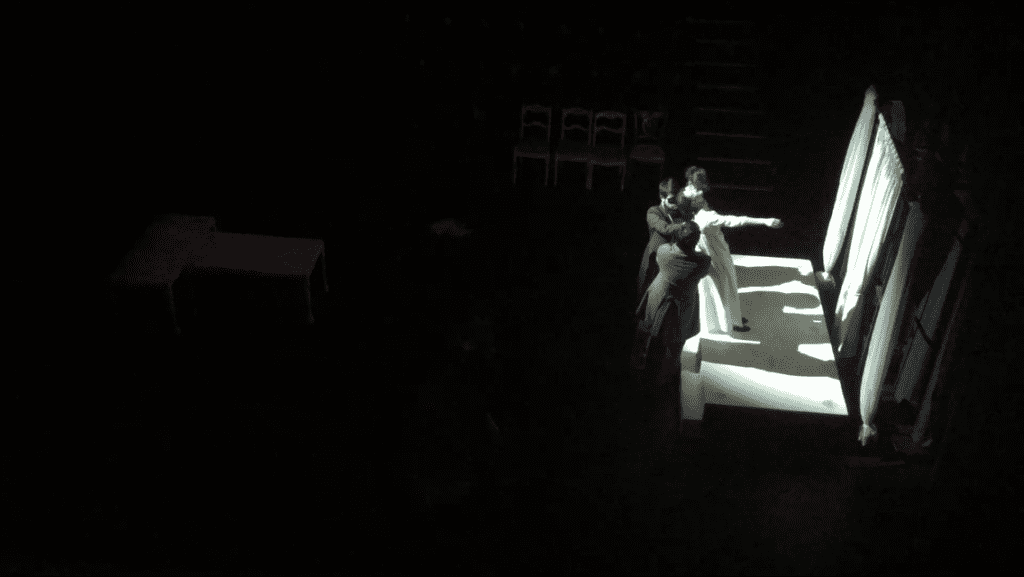Unique attributes of afO’s production of SENSE & SENSIBILITY
It is always a challenge to take a script developed by another company, for their stage and their actors. Bedlam Theatre’s innovative production of member Kate Hamill’s adaptation has received rave reviews for its lively and unusual devices. Their cast of 10 required far more doubling of roles, and their script suggested using a puppet for one character. But the script itself is robust, well-constructed, and lends itself to a variety of interpretations and flexibility in cast size, making it ideal for any company with more imagination than money.

afO was blessed by Tod Mohr’s willingness to construct our rolling tables, which attach securely with near-invisible magnets. We ended up using them a bit less than originally intended, but they still managed to serve us well as desks, dining tables, a piano forte and a bed, as well as several different horse-drawn carriages. Our Lady Middleton was the only actress to be wheeled about (our tip of the hat to the original production, in which ALL the furniture was on wheels).
One of the more significant changes to our production was the prologue. In Hamill’s original, all the Gossips enter talking simultaneously, which is mildly entertaining, but impossible to understand. For our purposes, a brief piece of doggerel was composed which underscores exactly what kind of folk these are. Both versions are nonsense, but one is clearer for our audience.

We chose to mask our Gossips, again for clarity, since they (mostly) did not change costumes for their named characters. (An exception was the actress playing Lucy Steele, who had a different gown for her Gossip role.) These simple masks were attached to eyeglass frames for ease, since at times the Gossips had to become named characters in mid-scene. The masks also served as metaphorical commentary on the anonymous quality of gossip, one of the things which allows it to do some much damage. The cloak of anonymity makes it safer to spread poison.
We also used more stylized masks for all the attendees at the London ball–except for Elinor and Marianne. (A huge thank you to Jennifer Netting, our Mrs. Jennings, who acquired and detailed all the masks.) This was to heighten the sense of their isolation in a room full of strangers, and add to the nightmare quality of the scene after Willoughby publicly shuns Marianne. Finally, the Gossips also played a variety of servant roles, all of whom were masked (except the Dashwoods’ named servant, Thomas). In the Regency, and still today, the servant class goes largely nameless and faceless.
One other use of masks came in another sequence unique to our production, a pantomime which took place during Colonel Brandon’s Act 2 monologue. In it, he details the tragic history of a young woman he once loved (and who reminds him of Marianne). Her orphaned, illegitimate daughter fell prey to Mr. Willoughby, who has since cruelly jilted Marianne. Our actors, accompanied by soft piano underscore, act out the story of Brandon’s early love. All are masked except Marianne, playing the role of Eliza. Since Brandon is now in love with Marianne, and has said she reminds him of Eliza, it seemed appropriate to allow her face to be shown.
Another much-remarked moment in our production is the storm sequence, which employs not only sound and lighting effects, but huge pieces of silk fabric–gray and black– which create obstacles for Marianne. The script says that the Gossips should buffet and hinder her, but the fabric adds a whole new dimension, suggesting the wind and rain, but physically ensnaring her as well. The music in the underscore is precisely timed with her fall into the Gossips’ arms. They then carry her to the bed and drape her in black as the music ends. It is one of the most beautiful and affecting scenes in the play.
Finally, some other added moments which facilitated the flow from scene to scene without requiring a blackout:
- In the scene in which Willoughby carries Marianne in, Margaret has the last line. Problem: in the following scene, she has the FIRST line, as she speaks to Sir John. We cross-faded to the Gossips, who had already been watching from across the stage in a dim light. They did a bit of comical pantomime, pretending to swoon, with a quick musical underscore. Then we faded back to the Dashwoods, with Margaret and Sir John entering and the scene as written.
- After Sir John Middleton visits the Dashwoods and hears about Willoughby’s rescue of Marianne, the scene immediately following is supposed to join the family in the middle of another Willoughby visit. This seemed a bit clumsy to us–we faded to follow-spots on Willoughby and Brandon coming from the opposite side of the stage, each with a bouquet of flowers. When Brandon sees Willoughby he stops and turns back. Willoughby continues into the scene, presents the flowers and a book of verse, and the scene continues as written.
- After Mrs. Dashwood and Colonel Brandon arrive to see the dangerously ill Marianne, Mrs. Dashwood asks Brandon to read to Marianne. Elinor and her mother have a brief conversation, Marianne has a single line speaking to Brandon, and the scene changes abruptly: Marianne is up, dressed and walking with Elinor. Wishing to avoid a blackout, and seeing an opportunity to show Brandon wooing Marianne, we faded to a special in which Brandon read Shakespeare’s Sonnet 23 (see below–aren’t the words just perfect?). The bed was removed, Marianne moved into another special and listened to him read. Quiet underscoring was used as well. This scene was also much commented-on.
Sonnet No. 23
William Shakespeare
As an unperfect actor on the stage,
Who with his fear is put besides his part,
Or some fierce thing replete with too much rage,
Whose strength’s abundance weakens his own heart;
So I, for fear of trust, forget to say
The perfect ceremony of love’s rite,
And in mine own love’s strength seem to decay,
O’ercharged with burden of mine own love’s might.
O let my books be then the eloquence
And dumb presagers of my speaking breast,
Who plead for love and look for recompense
More than that tongue that more hath more expressed.
O learn to read what silent love hath writ!
To hear with eyes belongs to love’s fine wit.



